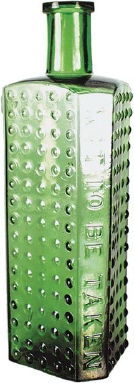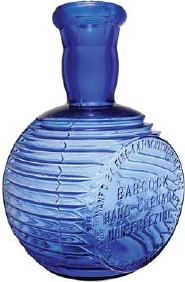 THE INTERNET
THE INTERNET Bottle Sources
Antique and collectible bottles can be found in a variety of places and sometimes where you least expect them. Excluding digging, the following sources are good potential hiding places for much sought-after bottles.
 THE INTERNET
THE INTERNET
In the 30 years that I’ve been collecting, I have never seen anything impact the hobby of bottle collecting as much as the Internet. Go to the Internet, type in the words “Antique Bottle Collecting,” and you’ll be amazed at the amount of instant data at your fingertips. Numerous Web sites throughout the United States, Canada, Europe, and Asia, provide information about clubs, dealers, antique publications, and auction companies. These sites have opened up the entire world and are convenient and in-expensive resources for collectors and dealers.
 FLEA MARKETS, SWAP MEETS, THRIFT STORES, GARAGE SALES, SALVAGE COMPANIES, AND SECONDHAND STORES
FLEA MARKETS, SWAP MEETS, THRIFT STORES, GARAGE SALES, SALVAGE COMPANIES, AND SECONDHAND STORES
For beginning collectors, these sources will likely be the most fun (next to digging) and yield the most bottles at the best prices. The majority of bottles found at these sources will fall into the common or common-but-above-average category.
Flea markets, Swap Meets, and Thrift Stores: Target areas where household goods are being sold. It’s a good bet they will have bottles.
Garage Sales: Focus on the older areas of town, since the items will be older, more collectible, and more likely to fall into a rare or scarce category.
Salvage Stores or Salvage Yards: These are great places to search for bottles, since these businesses buy from companies that tear down old houses, apartments, and businesses. A New York salvage company discovered an untouched illegal prohibition-era distillery complete with bottles, unused labels, and equipment. What a find!
 LOCAL BOTTLE CLUBS AND COLLECTORS
LOCAL BOTTLE CLUBS AND COLLECTORS
By joining a local bottle club or working with other collectors, you will find more ways to add your collection, gather information, and do more digging. Members usually have quantities of unwanted or duplicate bottles, which they will sell very reasonably, trade, or sometimes even give away, especially to an enthusiastic new collector.
 BOTTLE SHOWS
BOTTLE SHOWS

Bottle shows not only expose collectors to bottles of every type, shape, color, and variety, but also provide them the opportunity to talk with experts in specialized fields. In addition, publications dealing with all aspects of bottle collecting are usually available for sale or even free. Bottle shows can be rewarding learning experiences not only for beginning collectors but also for veteran collectors. They take place almost every weekend all across the country, and they always offer something new to learn and share and, of course, bottles to buy or trade.
Make sure you look under the tables at these shows because many great bargains in the form of duplicates and unwanted items may be lurking where you least expect it. Quite often, diggers find so many bottles that they don’t even bother to clean them. Instead, they offer them as is for a very low price. Hey, for a low price, I’ll clean bottles!
 AUCTION AND ESTATE SALES
AUCTION AND ESTATE SALES
Auction houses have become a good source of bottles and glassware over the last few years. When evaluating auction houses, look for an auction company that specializes in antiques and estate buyouts. To promote itself and provide buyers with a better idea of what will be presented for sale, an auction house usually publishes a catalog that provides bottle descriptions, conditions, and photographs. I recommend, however, that you first visit an auction as a spectator to learn how the process works before you decide to participate. When buying, be sure of the color and condition of the bottle, and terms of the sale. These guidelines also apply to all Internet auctions. Use caution and follow these general rules:
 BUYING AT AUCTIONS
BUYING AT AUCTIONS
 Purchase the catalog and review all the items in the auction. At live auctions, a preview is usually held to inspect the items by the customers.
Purchase the catalog and review all the items in the auction. At live auctions, a preview is usually held to inspect the items by the customers.
 After reviewing the catalog and making your choice, phone or mail your bid. A 10 to 20 percent buyer’s premium is usually added to the sale price.
After reviewing the catalog and making your choice, phone or mail your bid. A 10 to 20 percent buyer’s premium is usually added to the sale price.
 Callbacks allow bidders to increase the previous high bid on certain items after the close of the auction.
Callbacks allow bidders to increase the previous high bid on certain items after the close of the auction.
 The winning bidder receives an invoice in the mail. After the bidder’s check clears, the bottles are shipped.
The winning bidder receives an invoice in the mail. After the bidder’s check clears, the bottles are shipped.
 Most auction houses have a return policy, as well as a refund policy, for items that differ from the description in the catalog.
Most auction houses have a return policy, as well as a refund policy, for items that differ from the description in the catalog.
The “Auction Companies” chapter lists a number of quality auction houses that specialize in bottles, pottery, and related glass items.
 SELLING AT AUCTIONS
SELLING AT AUCTIONS
 Check and evaluate the auction source before consigning any merchandise. Make sure that the auction venue is legitimate and has not had any problems with payments or product.
Check and evaluate the auction source before consigning any merchandise. Make sure that the auction venue is legitimate and has not had any problems with payments or product.
 Package the item with plenty of bubble wrap, insure your bottle, and mail the package by certifi ed mail, signed receipt requested.
Package the item with plenty of bubble wrap, insure your bottle, and mail the package by certifi ed mail, signed receipt requested.
 Allow 30 days to receive payment and be aware that most firms charge a 15 percent commission on the sales price.
Allow 30 days to receive payment and be aware that most firms charge a 15 percent commission on the sales price.

 ESTATE SALES
ESTATE SALES
An estate sale is a great source for bottles if the home is in a very old neighborhood or section of the city that has historical significance. These sales are a lot of fun, especially when the people running the sale let you look over and handle the items to be able to make careful selections. Prices are usually good and are always negotiable.
 KNIFE AND GUN SHOWS
KNIFE AND GUN SHOWS
Bottles at a knife and gun shows? Yes! Quite a few gun and knife enthusiasts are also great fans of the West and keep an eye open for related artifacts. Every knife and gun show I’ve attended has had at least 10 dealers with bottles on their tables (or under the tables) for sale. And the prices were about right, since they were more interested in selling their knives and guns than the bottles. Plus, these dealers will often provide information on where they made their finds, which you can put to good use later.
 RETAIL ANTIQUE DEALERS
RETAIL ANTIQUE DEALERS
This group includes dealers who sell bottles at or near full market prices. Buying from dealers has advantages and disadvantages. They usually have a large selection and will provide helpful information and details about the bottles. And it’s a safe bet that the bottles for sale are authentic. On the other hand, it s can be very expensive to build a collection this way. But these shops are a good place to browse and learn.
 GENERAL ANTIQUE AND SPECIALTY SHOPS
GENERAL ANTIQUE AND SPECIALTY SHOPS
The difference between general and retail antique shops is that general shops usually have lower prices and a more limited selection than retail shops. This is partly because merchants in general shops are not as well informed about bottles and may overlook critical characteristics. If a collector is well informed, general antique dealers can provide the opportunity to acquire underpriced quality merchandise.